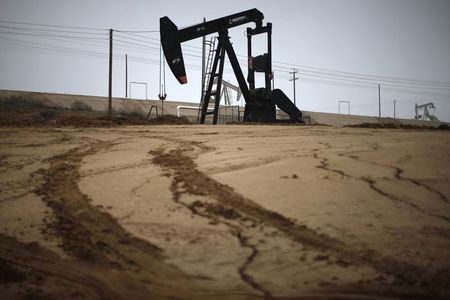
Investing.com– Oil prices fell slightly in Asian trade on Tuesday, losing some ground after pledges of more stimulus in top importer China and heightened geopolitical tensions in Syria sparked strong gains.
Anticipation of more economic signals from China and the U.S. in the coming days also kept traders to the sidelines, as did caution over a monthly report from the OPEC.
Brent oil futures expiring in February fell 0.2% to $72.0 a barrel, while West Texas Intermediate crude futures fell 0.2% to $67.96 a barrel by 20:44 ET (01:44 GMT).
Oil markets cheer China stimulus, more cues awaited
Oil prices rose over 1% on Monday after China’s top political body announced a shift towards looser monetary policy and flagged plans for more stimulus measures.
Beijing said it will support stock and property markets while “vigorously” supporting local consumption- its most clear signal yet of more targeted stimulus measures.
The announcement sparked a rally across commodity markets, with oil also benefiting from hopes that an improvement in China’s economy will boost its appetite for raw materials.
China’s Central Economic Work Conference, which is set to begin on Wednesday, is now expected to provide more insight into plans for stimulus. Before that, trade data for November is due later on Tuesday.
Announcement of more stimulus measures helped traders look past disappointing Chinese inflation data for November, which furthered the case for more economic support.
Beyond China, oil markets are bracing for a string of key economic readings and central bank meetings scheduled for the last few weeks of 2024. U.S. consumer inflation data is due on Wednesday, coming just a week before a Federal Reserve meeting.
Syria tensions keep risk premium in play
Oil prices saw a higher risk premium this week, after rebel forces ousted Syrian President Bashar al-Assad and installed a new regime, ending a 13-year civil war.
But traders were uncertain over what a regime change entailed for Syria and broader Middle Eastern geopolitics.
Syria’s new regime is likely to be backed by groups with ties to the Sunni Islamic sect, putting it at odds with Iran. This could give the U.S. government more headroom to impose stricter sanctions against Iran.
Syria’s oil production was also eroded by over a decade of civil war, but could pick up under a new regime, increasing global oil supplies.
At its peak, the country produced over 600,000 barrels of oil per day.
This post is originally published on INVESTING.


